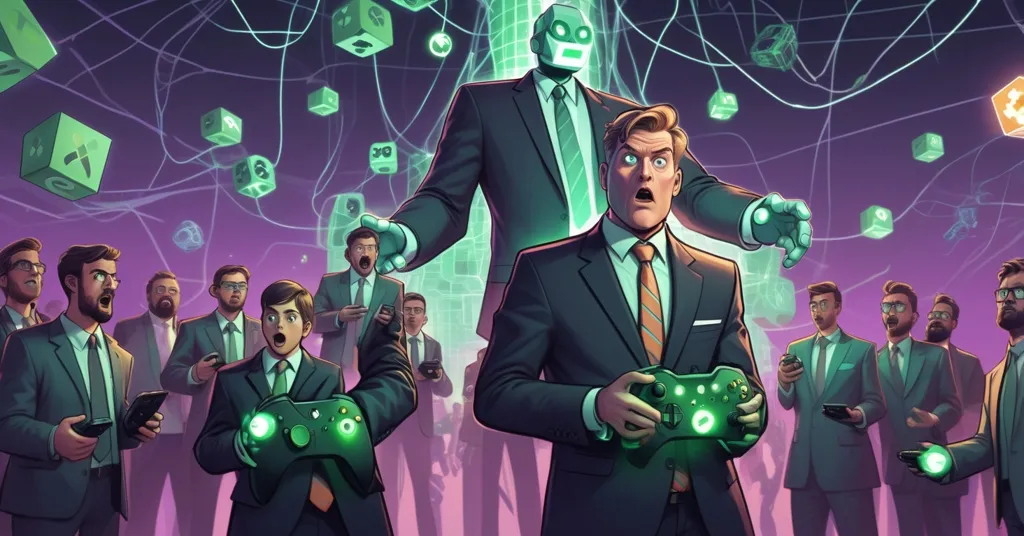Xbox Game Pass Ultimate Soars to $30: Microsoft’s Power Play or Overreach in Gaming?

Microsoft’s Xbox Game Pass Ultimate Hits $30 a Month: Bold Strategy or Corporate Overreach?
Microsoft has just unleashed a seismic shift in the gaming world, jacking up the price of its Xbox Game Pass Ultimate subscription by a whopping 50% to $30 per month. As the tech giant doubles down on subscriptions over hardware and hikes console prices in the U.S. yet again, the move raises big questions about value, control, and centralization—issues that hit close to home for those of us tracking the crypto and blockchain spaces.
- Sticker Shock: Xbox Game Pass Ultimate surges from $20 to $30 monthly with promises of more games and better streaming.
- Hardware Hikes: Xbox console prices climb for the second time in 2024, blamed on tariffs and economic headwinds.
- Regulatory Red Flags: The FTC calls out Microsoft for anti-competitive behavior after the Activision Blizzard merger.
What’s Behind the Xbox Game Pass Price Jump?
Let’s break down Microsoft’s latest power play. The Xbox Game Pass Ultimate, now priced at $30 per month, grants access to a library of over 400 games, day-one releases of major titles, and upgraded cloud streaming. For those new to the term, cloud streaming allows gamers to play high-end titles on modest devices by running the heavy lifting on remote servers—a bit like renting computing power rather than owning it. Microsoft insists this hefty price increase brings added value, pointing to an expanded game catalog and a smoother user experience as justification.
“As we continue to evolve Xbox Game Pass, we’re focused on delivering more value, more benefits, and more great games across every plan.” – Microsoft Corp.
The other subscription tiers, rebranded as Essential and Premium, will hold steady at their current prices while receiving some unspecified enhancements. With a subscriber base of 34 million in 2024 and projected sales nearing $5 billion in fiscal 2025, Game Pass is a cornerstone of Microsoft’s revenue stream. But at $30 a month, are gamers getting a fair shake, or is this just a slick way to squeeze more from loyal fans?
Console Prices Climb Again Amid Tariff Tensions
Adding insult to injury, Microsoft is raising Xbox console prices in the U.S. for the second time this year. The Xbox Series S now retails for $399, up from $379, while the 1TB version hits $449. The digital-only Xbox Series X costs $599, the disc drive model is $649, and the top-tier 2TB Series X jumps to $799 from $729. Microsoft attributes these increases to macroeconomic challenges and reimposed tariff policies under the Trump administration, which have driven up hardware import costs. They’re not the only ones feeling the pinch—Sony and Nintendo have also bumped up U.S. prices citing the same pressures.
“We understand that these changes are challenging, and they were made with careful consideration.” – Microsoft Corp. on console price hikes.
Yet, the timing feels suspiciously convenient. Microsoft is openly pivoting away from traditional console sales toward a broader content distribution model across devices. If hardware is no longer the focus, why pass such steep costs onto consumers? It smells more like a ‘because we can’ move than a necessity, especially when the subscription model is already raking in billions.
Activision Blizzard Merger and Regulatory Backlash
This isn’t just about pricing—it’s about power. Microsoft’s $69 billion acquisition of Activision Blizzard in 2023 was pitched as a game-changer for Game Pass, bringing heavyweights like Call of Duty and World of Warcraft into the fold. The goal? Make the subscription irresistible and lock users into Microsoft’s ecosystem. But the U.S. Federal Trade Commission (FTC), a government agency tasked with safeguarding consumers from unfair business practices, isn’t buying the hype. They’ve accused Microsoft of anti-competitive behavior, arguing that these price hikes, alongside what they term “product degradation” and cutbacks like employee layoffs, are signs of a company abusing market dominance post-merger.
“Microsoft’s price increases and product degradation, combined with Microsoft’s reduced investments in output and product quality via employee layoffs, are the hallmarks of a firm exercising market power post-merger.” – U.S. Federal Trade Commission.
Reports of buggy updates to Xbox systems and significant layoffs—thousands of jobs cut across gaming divisions since the merger—lend weight to the FTC’s claims. When a single player holds this much sway, whether in gaming or elsewhere, the end user often pays the price. Sound familiar? It’s the same centralization concern we wrestle with in crypto, where big exchanges or mining pools can tilt the playing field.
Microsoft’s Subscription Bet: Genius or Greed?
Let’s give credit where it’s due for a moment. Microsoft’s push toward a subscription-first model isn’t just a cash grab—it’s a survival tactic. Physical console sales are on a downward trend, and building a digital ecosystem accessible on any device, from phones to PCs, is a smart pivot. Think of Game Pass as a digital arcade pass: one fee, unlimited plays, endless convenience. With steady income from subscribers—much like earning interest by locking crypto into a staking pool—Microsoft secures predictable revenue while keeping users hooked with exclusive content. If executed well, this could fund better games and tech, much as Ethereum’s gas fees support network upgrades.
But here’s the flip side: convenience often masks control. A subscription ties you to Microsoft’s terms, and at $30 a month, that’s a steep leash for many. Plus, the layoffs and quality concerns raised by the FTC suggest the company might be prioritizing profit over innovation or community. Gamers venting on social media aren’t shy about their frustration, with many calling the hike a betrayal of trust. So, is this model a win for the future of gaming, or just a dressed-up way to charge more for less?
Centralization Woes: A Crypto Parallel
For those of us in the Bitcoin and blockchain space, Microsoft’s power play serves as a glaring reminder of why decentralization matters. Just as large crypto exchanges or Bitcoin mining pools can dominate and dictate terms to smaller players, Microsoft’s grip on gaming—bolstered by mergers and price control—squeezes out competition and consumer choice. And let’s not ignore the tariff angle: these policies driving up Xbox costs could easily hit crypto hardware next. Many mining rigs for Bitcoin or altcoins are imported, often from China. If tariffs slap a premium on those, small-scale miners get priced out, further centralizing power among deep-pocketed players who can absorb the blow.
The FTC’s scrutiny of Microsoft also mirrors regulatory heat in our world. When centralized entities overreach, governments take notice—whether it’s a tech giant hiking prices or a crypto platform accused of manipulating markets. The lesson? Consolidation breeds vulnerability, and regulators are watching.
Could Blockchain Gaming Be the Slingshot to Microsoft’s Goliath?
So, is there an escape from Microsoft’s walled garden? Blockchain technology might just hold the key. At its core, blockchain is a decentralized ledger recording transactions without a middleman—think of it as a public record no single entity controls. Applied to gaming, this could mean platforms where players truly own in-game assets as Non-Fungible Tokens (NFTs), unique digital items verified on a blockchain, which you can trade or sell without a corporate cut. No $30 monthly fee to a tech overlord—just direct dealings between gamers and developers.
Real-world experiments are already underway. Axie Infinity lets players earn cryptocurrency by battling digital creatures, turning gameplay into income. The Sandbox, built on Ethereum (a blockchain supporting smart contracts for decentralized apps), allows users to create and monetize virtual worlds, with ownership secured on-chain. Imagine buying a Call of Duty skin with Bitcoin, owning it outright, and reselling it on a peer-to-peer marketplace. No Game Pass subscription needed.
Before we pop the champagne, let’s acknowledge the hurdles. Blockchain gaming is rough around the edges—transaction fees on networks like Ethereum can sting, sometimes costing more than the item you’re buying during peak congestion. Setting up a crypto wallet to play these games is a barrier for non-tech-savvy users, and regulatory uncertainty looms, with some governments eyeing NFTs as gambling or securities. Still, in the spirit of effective accelerationism—pushing tech forward fast, flaws and all—these early stumbles could pressure giants like Microsoft to adapt or lose ground. If Bitcoin cut banks out of money, why can’t blockchain cut gatekeepers out of gaming?
From a Bitcoin maximalist lens, there’s even potential for microtransactions using BTC itself. Imagine paying for in-game perks with tiny fractions of Bitcoin via the Lightning Network, a layer-2 solution for fast, cheap transactions. It’s financial sovereignty extended to digital playfields—a purist’s dream, though altcoin ecosystems like Ethereum might be better suited for complex NFT integrations. Both have a role in this disruption.
Key Takeaways and Reflections
- Why is Microsoft betting big on subscriptions like Game Pass?
They’re chasing steady income and user loyalty in a shrinking console market, much like how staking in decentralized finance (DeFi—a system of financial apps on blockchain without middlemen) rewards long-term crypto holders with consistent returns. - How do tariffs affect tech, and could they impact crypto gear?
Tariffs have pushed Xbox prices higher in the U.S., and similar policies could inflate costs for imported Bitcoin mining rigs, making it tougher for small miners to compete and risking more centralization. - Does Microsoft’s dominance mirror centralization risks in blockchain?
Absolutely—the FTC’s concerns over Microsoft’s market power post-merger echo fears in crypto about dominant exchanges or mining pools stifling innovation and fairness for smaller players. - Can blockchain gaming challenge centralized models like Game Pass?
Yes, but it’s early days. Platforms using NFTs and tokens could enable direct gamer-developer transactions, bypassing corporate fees, though high costs and clunky interfaces remain obstacles. - What can the crypto community learn from Microsoft’s regulatory challenges?
The FTC’s pushback shows regulators are vigilant about market overreach, a cue for crypto projects to prioritize true decentralization and transparency to dodge similar scrutiny.
Microsoft’s latest moves are a double-edged sword. The beefed-up Game Pass at $30 a month might deliver for die-hard gamers craving new titles and seamless streaming, but the price hikes—on both subscriptions and hardware—paired with regulatory criticism paint a troubling picture of overreach. For those of us rooting for decentralization, whether in finance or gaming, this is a wake-up call. Centralization often comes at the user’s expense, and while blockchain gaming isn’t ready to topple giants like Microsoft yet, the seeds of disruption are planted. As regulators sharpen their blades and gamers grumble, the question lingers: will decentralized tech be the slingshot to bring down this corporate Goliath, or are we still years from a level playfield?



